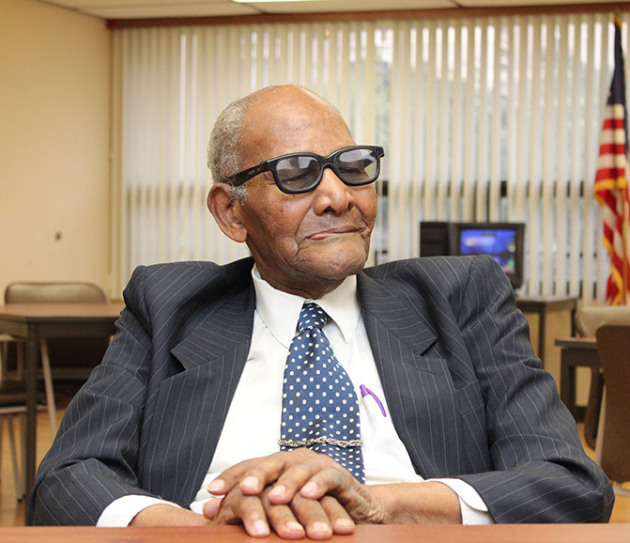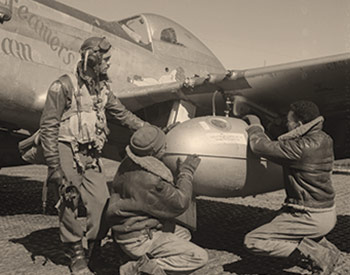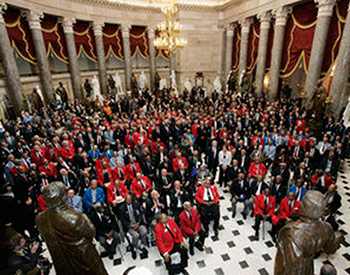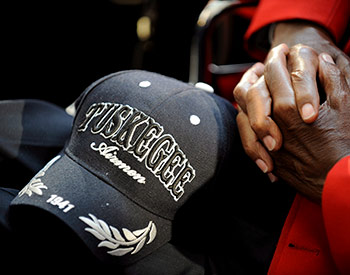
Imagine if you were a member of one of history’s most famous groups, yet your contribution was never recognized for nearly 70 years, primarily due to issues like racism, denial, spite and ignorance.
Now suppose you were finally acknowledged, how would you respond?
If you’re one of the documented original Tuskegee Airmen (DOTA) like Willie N. Rogers, 99, you might respond in the quiet, humble, dignified manner that has marked the time he has lived in St. Petersburg, Florida at Burlington Tower, a United Church Homes affordable housing community. Why would anyone expect something different from such a reserved, reticent and humble man as Willie?
Willie was a Master Sergeant in the 100th Fighter Squadron of the Air Force when fate and his well-honed administrative skills made him part of the Tuskegee Airmen group, made famous in the 2012 movie Red Tails. Willie’s not one to thump his chest or draw attention to himself, so he wasn’t likely to talk (even when asked directly) about his war experience with a group that so dramatically changed race relations within the U.S. Armed Forces.
 The Tuskegee Airmen were organized in March 1941 following a proclamation by President Franklin D. Roosevelt who, against the concerns voiced by his top generals, ordered the creation of an all black flight training program. Just two years earlier, studies commissioned by the Army War College had concluded that blacks were unfit for leadership and incapable of flying complex machines like escort jets. That the Tuskegee Airmen excelled was a big surprise in an era of such deep seated racism in American society.
The Tuskegee Airmen were organized in March 1941 following a proclamation by President Franklin D. Roosevelt who, against the concerns voiced by his top generals, ordered the creation of an all black flight training program. Just two years earlier, studies commissioned by the Army War College had concluded that blacks were unfit for leadership and incapable of flying complex machines like escort jets. That the Tuskegee Airmen excelled was a big surprise in an era of such deep seated racism in American society.
Comprised of nearly 1,000 pilots and 9,000 support staff on the ground, the Tuskegee Airmen served with distinction in the European theater of World War II. Collectively, they earned 850 military honors, including Distinguished Flying Crosses, Bronze Stars, Silver Stars, Legions of Merit and one Presidential Unit Citation. Experts have speculated the medal/award count would have easily been tripled or quadrupled had the DOTAs been white. They will forever be an honored part of U.S. military history.
 In March 2007 the 300 surviving members of the Tuskegee Airmen all received the Congressional Gold Medal, the highest ranking civilian honor that can be bestowed upon an individual by Congress. Willie Rogers recalls the honor to finally receive this recognition within this lifetime, after years of prejudice.
In March 2007 the 300 surviving members of the Tuskegee Airmen all received the Congressional Gold Medal, the highest ranking civilian honor that can be bestowed upon an individual by Congress. Willie Rogers recalls the honor to finally receive this recognition within this lifetime, after years of prejudice.
Willie served with distinction, quietly helping to break the bonds of segregation in the U.S. Armed Forces, and ultimately paving the way for the Civil Rights movement some 20 years later.
There are other remarkable aspects to Willie’s life. He graduated from Claflin College of Agriculture and Mechanical Institute (now Claflin University) in Orangeburg, South Carolina, at a time when very few blacks were earning college degrees. That he did so after reluctantly leaving high school for a time to work and support his family speaks to his drive and determination. It was his college degree that prompted his being assigned to the Tuskegee group.
The creation of the Tuskegee Airmen was a subject for public ridicule and widely expected to fail. The U.S. government was certain that these personnel, solely due to their race, would not stand up to the pressures and decision-making skills necessary to win the war. Their task was further complicated when they were issued old planes that were more difficult to maneuver. Eventually, the Airmen proved their worth as trusted escorts of white pilots, though segregation remained an issue for many years.
Willie is quick to assert he was not a pilot or a co-pilot, remaining on the ground to carry out logistics and administrative duties. He still managed to see combat with his unit in Italy, getting shot and wounded in the leg during a mission.
 It took 70 years for Mr. Rogers to be recognized with certifiable proof of his place in history as one of the Tuskegee Airmen, a title he accepts most humbly. The enlisted soldiers and veterans have risked their lives for others, exemplifying fortitude and freedom for all humanity. It is a great honor and privilege for United Church Homes to have a resident with this strength of character living among us, representing the best of everything we as Americans stand for.
It took 70 years for Mr. Rogers to be recognized with certifiable proof of his place in history as one of the Tuskegee Airmen, a title he accepts most humbly. The enlisted soldiers and veterans have risked their lives for others, exemplifying fortitude and freedom for all humanity. It is a great honor and privilege for United Church Homes to have a resident with this strength of character living among us, representing the best of everything we as Americans stand for.
